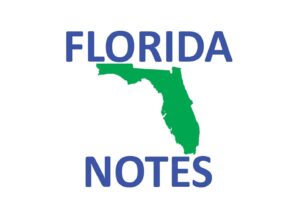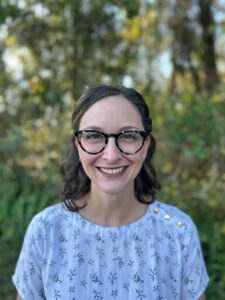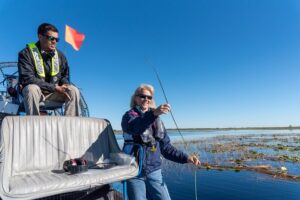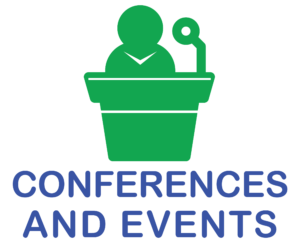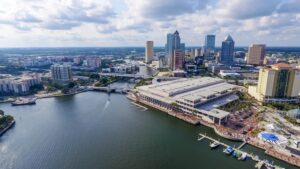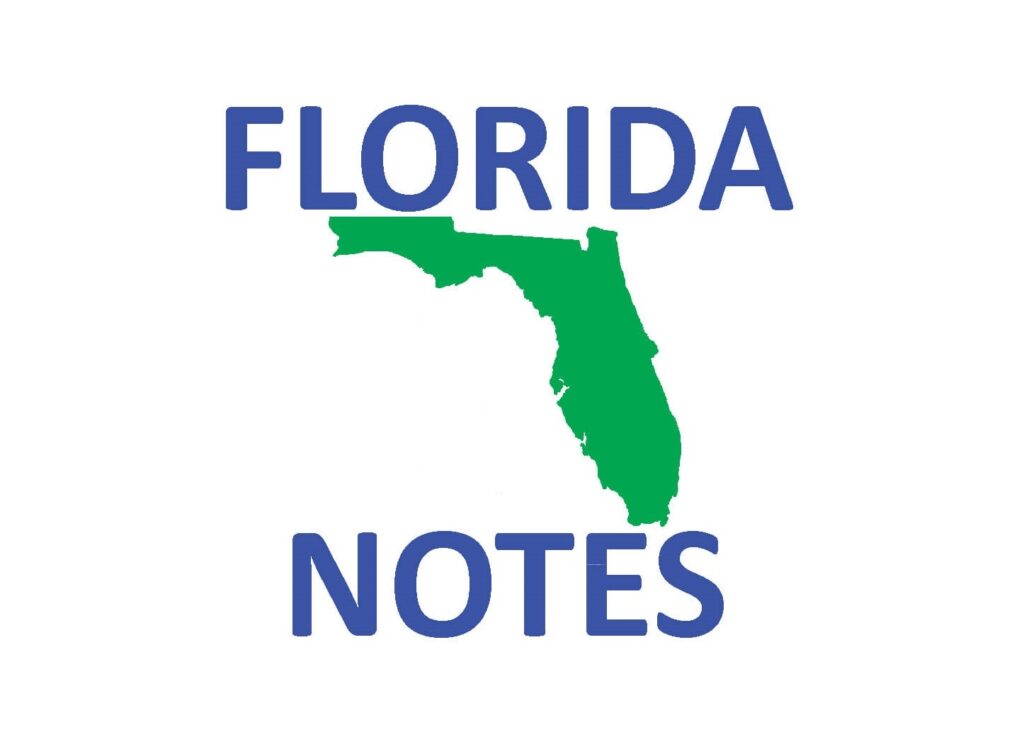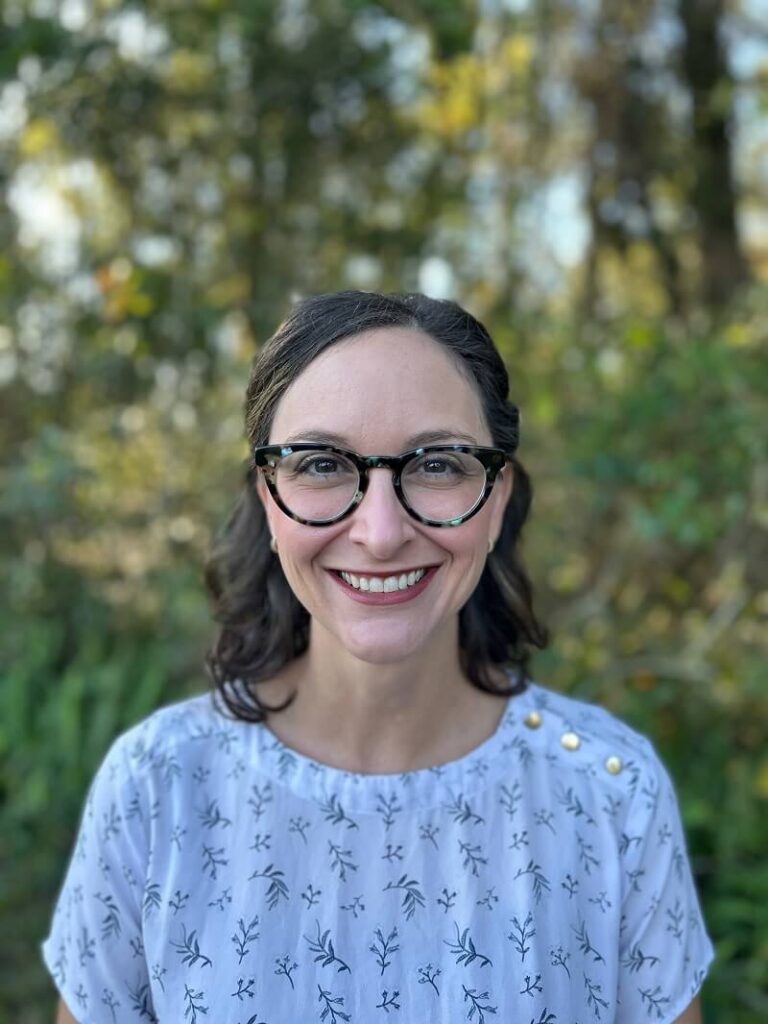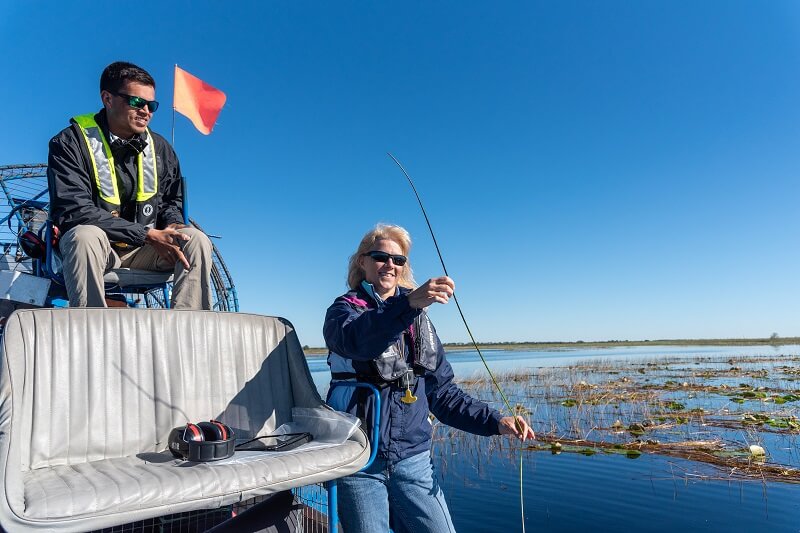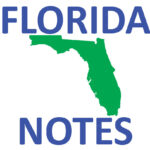
The Miami Waterkeeper recently hosted its annual State of the Water event. This year focused on coral, restoration, and conservation. Programs presented include the University of Miami’s Coral Reef Futures Lab 3D Printed Corals X-REEFS Project and NOAA’s Sequential Treatment Application Robot (STAR).
X-REEFS is striving to develop hybrid reefs that combine the wave-protection benefits of artificial structures with the ecological benefits of coral reefs. The project is part of a federal grant from the U.S. Defense Advanced Research Projects Agency (DARPA) to help address security threats to the military and civilian infrastructure along vulnerable coastal regions in Florida and the Caribbean.
The X-REEFS project is engaged in the development of an innovative hybrid biological and engineered reef-mimicking structure, with resilient ecological properties designed to survive changing environmental conditions. The project includes specialists in structural engineering, physical and chemical oceanography, reef ecology and restoration, and adaptive biology for the development of biocompatible, wave-attenuating structures that promote rapid growth of corals and build reef resilience by increasing coral resistance to thermal stress and disease to withstand future changes.
NOAA’s STAR uses innovative science and applications to transform satellite observations into information essential to society’s evolving environmental, security, and economic decision-making. NOAA is tracking Marine heatwave (MHW)–driven events that strongly correlate with rising sea surface temperature (SST) and climate cycles such as El Niño–Southern Oscillation. Patterns of SST from the past 40 years indicate that unprecedented mass coral bleaching and mortality will likely occur across the Indo-Pacific throughout 2024.
Jackson County’s Ronnie Stephenson Named 2024 Florida Land Steward of The Year
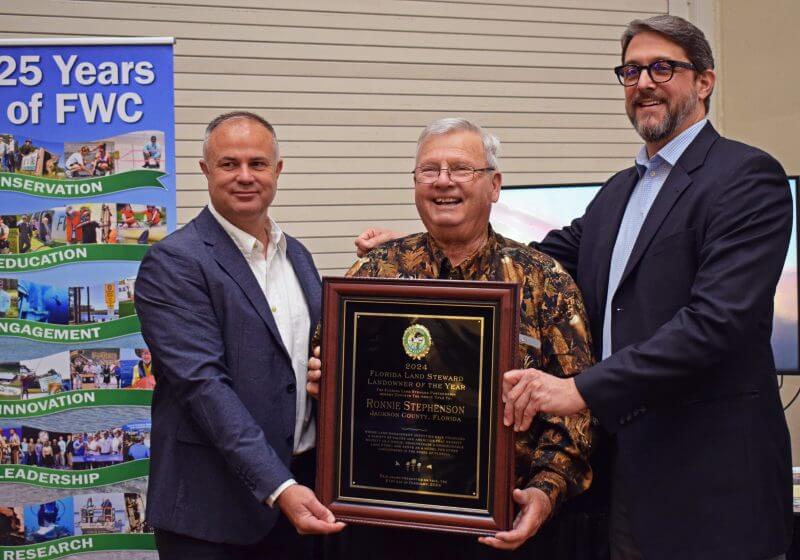
Ronnie Stephenson was recognized with the Landowner of the Year award in February at the Florida Fish and Wildlife Conservation Commissioner’s meeting in Tallahassee. Stephenson was recognized for his passion for wildlife and his tenacity for hands-on habitat management.
He manages his two Jackson County farms and shares his knowledge and enthusiasm for land stewardship with fellow landowners and other wildlife enthusiasts. Stephenson led a d tour on his property to demonstrate how landowners can integrate wildlife practices into their forestry operations. He has also made multiple appearances on Winston Chester’s Panhandle Outdoors show. Ronnie’s tireless contributions to wildlife and habitat management have been an example of dedication and hard work that will expand and inspire the next generation of land stewards.
University of Florida App Helps Consumers Find Pollinator-Friendly Plants
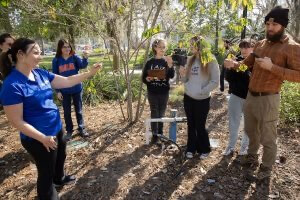
The Florida-Friendly Landscaping (FFL) program at the University of Florida developed an online and mobile app to help the public identify bees and bee-friendly plants in their yards. The BeeGardens app was designed to help the public quickly access information about more than 85 bee-friendly plants, which attract 12 types of bees. The app also gives tips on how to incorporate these plants into landscapes.
According to the University, Florida is home to more than 315 species of native wild bees, which thrive on flowers for survival. But some bees are in critical decline. While the public is increasingly interested in conserving pollinators and in pollinator-friendly gardening, a 2020 University of Florida survey showed a knowledge gap in consumers’ ability to identify a range of bee pollinators and the plants that attract them.
“The app was built for the homeowner using the FFL plant database, to raise awareness of how landscapes can be designed to support bees year-round. It is similar to the FFL butterfly app, but this one is specifically for bees,” said Sandra Wilson, a UF/IFAS professor of environmental horticulture. Since it was launched, the BeeGardens app has averaged more than 1,200 unique visits per month, revealing its popularity and wide use. That’s 22,673 unique users from across Florida and beyond, she said.
The USACE Jacksonville District Releases Draft EA of Bunnell Wastewater Treatment Infrastructure Modernization
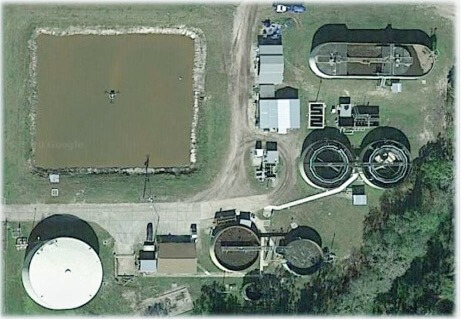
The U.S. Army Corps of Engineers Jacksonville District is wrapping up public review and comment on its recently released Draft Environmental Assessment (EA) for the City of Bunnell Comprehensive Wastewater Treatment Infrastructure Modernization Project in Flagler County.
Per USACE standard, the environmental analysis was conducted in accordance with the National Environmental Policy Act of 1969, which as amended, addresses the provision of design and construction assistance for a publicly owned, non-federal water-related environmental infrastructure project in Northeast Florida.
The EA evaluated various alternatives for facility improvements. The preferred alternative is Alternative 2, which includes USACE providing design and construction assistance for a series of equipment and structure improvements, subject to the availability of federal funding.
NOAA’s GOES-U Arrives in Florida, Prepares for Spring Launch
GOES-U, the last of NOAA’s advanced GOES-R series of satellites, arrived recently at NASA’s Kennedy Space Center in Florida to begin final preparations for its upcoming launch. GOES-U is scheduled to launch no earlier than April 30, 2024, aboard a SpaceX Falcon Heavy rocket.
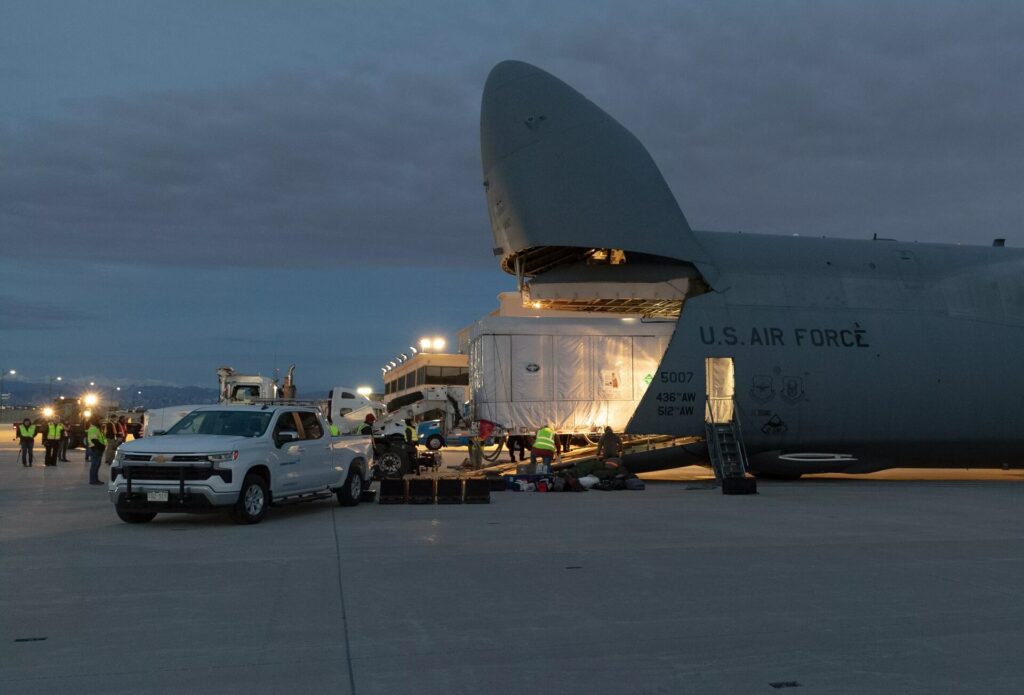
NOAA’s GOES-U, the fourth and final satellite in the Geostationary Operational Environmental Satellites (GOES) – R Series, the Western Hemisphere’s most advanced weather-observing and environmental monitoring system, is entering the final stage of preparations before liftoff, according to NASA
GOES-U weighs more than 6,000 pounds. Data from the environmental monitoring satellite constellation enables forecasters to predict, observe, and track local weather events that affect public safety like thunderstorms, hurricanes, wildfires, and solar storms.
The University of South Florida is Tackling Environmental Challenges with Community Partnership
USF is strengthening its collaboration with Tampa Bay Wave and the St. Petersburg Innovation District through a new program that addresses some of the nation’s most pressing environmental concerns.
Tampa Bay Wave is coordinating with BlueTech|X Accelerator, a tech start-up organization, to bring together small businesses and entrepreneurs who are pioneering ocean, coastal and Great Lakes-based solutions through observation technologies, products and services that address climate resiliency needs.
“USF is poised to make a substantial contribution to the BlueTech|X Accelerator, leveraging our Gulf Coast research facilities, faculty expertise in oceanography and environmental and marine sciences and strong ties with Tampa Bay’s entrepreneurial community,” said Sylvia Thomas, USF vice president for Research & Innovation.
The BlueTech|X Accelerator is made possible through a $250,000 grant the National Oceanic and Atmospheric Administration awarded to Tampa Bay Wave through its Ocean-Based Climate Resilience Accelerators program. The accelerator will be instrumental in shaping innovative solutions in ocean renewable energy, coastal and ocean carbon sequestration, hazard mitigation and ecosystem services.
National Institute of Building Sciences Issues Report on Access to Clean Water and Sanitation
The National Institute of Building Sciences (NIBS) issued a new report in February entitled Clean Water, Sanitation, and the Built Environment, focusing on how commercial and residential buildings access and use water resources.
“The development of a national strategy to provide sustainable water and sanitation services to rural and disadvantaged communities is of critical importance,” said Stephen T. Ayers, Interim President & CEO. “Part of this must include increased funding for water sector workforce programs to ensure a pipeline of future skilled workers.”
The report was prepared by the NIBS Consultative Council, an assembly of high-level building leaders that makes recommendations directly to the President of the United States, Congress, and state and local policymakers to improve the nation’s buildings and infrastructure.
The water and sanitation access report recommends improved and increased data collection regarding water access, quality, and use in households and buildings, increased market share for WaterSense and other efficiency programs, expansion of the use of alternate water sources, and increased focus to water efficiency as it relates to energy efficiency, and increased funding for centralized and decentralized water and sanitation infrastructure, especially for projects in underserved communities, and support for strong water treatment standards.
The Consultative Council’s Clean Water and Sanitation report will be included in a three-part 2024 Moving Forward Report to the President this spring.
Together for Safer Roads and The National Waste & Recycling Association Partner to Expand FOCUS on Fleet Safety Training Program to Small Haulers
Together for Safer Roads (TSR) and The National Waste & Recycling Association (NWRA) announced a partnership to extend a Fleet Safety Training Program to independent and small haulers within the waste and recycling industry. This collaboration builds on the success of the program in fostering safe and efficient fleet operations, and it represents a significant step towards enhancing safety cultures and achieving Vision Zero goals.
TSR’s signature workforce development safety program, the FOCUS on Fleet Safety Training Program, helps independent fleet operators develop a safety culture. Now, TSR, in collaboration with NWRA, seeks to bring this critical training initiative to independent haulers to address the unique challenges within this segment of the waste and recycling industry.
NWRA and TSR are in the process of identifying fleets to participate in this new FOCUS cohort. Companies that are interested in participating or learning more are encouraged to reach out. TSR collaborates with governments, businesses, and community stakeholders on local projects, fleet safety management, and technology initiatives, with the ultimate goal of achieving Vision Zero.

